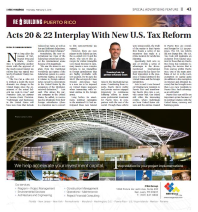-
Financial statements audits
Financial statement audits
-
Compliance audits
Compliance audits
-
Compilations and reviews
Compilations and audit
-
Agreed-upon procedures
Agreed-upon procedures
-
Corporate and business tax
Our trusted teams can prepare corporate tax files and ruling requests, support you with deferrals, accounting procedures and legitimate tax benefits.
-
International tax
Our teams have in-depth knowledge of the relationship between domestic and international tax laws.
-
Tax compliance
Business Tax
-
Individual taxes
Individual taxes
-
Estate and succession planning
Estate and succession planning
-
Global mobility services
Through our global organisation of member firms, we support both companies and individuals, providing insightful solutions to minimise the tax burden for both parties.
-
Sales and use tax and indirect taxes
SUT/ VAT & indirect taxes
-
Tax incentives program
Tax incentives program
-
Transfer Pricing Study
The laws surrounding transfer pricing are becoming ever more complex, as tax affairs of multinational companies are facing scrutiny from media, regulators and the public
-
Business consulting
Our business consulting services can help you improve your operational performance and productivity, adding value throughout your growth life cycle.
-
Forensic and investigative services
At Grant Thornton, we have a wealth of knowledge in forensic services and can support you with issues such as dispute resolution, fraud and insurance claims.
-
Fraud and investigations
The commercial landscape is changing fast. An ever more regulated environment means organizations today must adopt stringent governance and compliance processes. As business has become global, organizations need to adapt to deal with multi-jurisdictional investigations, litigation, and dispute resolution, address the threat of cyber-attack and at the same time protect the organization’s value.
-
Dispute resolutions
Our independent experts are experienced in advising on civil and criminal matters involving contract breaches, partnership disputes, auditor negligence, shareholder disputes and company valuations, disputes for corporates, the public sector and individuals. We act in all forms of dispute resolution, including litigation, arbitration, and mediation.
-
Business risk services
We can help you identify, understand and manage potential risks to safeguard your business and comply with regulatory requirements.
-
Internal audit
We work with our clients to assess their corporate level risk, identify areas of greatest risk and develop appropriate work plans and audit programs to mitigate these risks.
-
Service organization reports
As a service organization, you know how important it is to produce a report for your customers and their auditors that instills confidence and enhances their trust in your services. Grant Thornton Advisory professionals can help you determine which report(s) will satisfy your customers’ needs and provide relevant information to your customers and customers’ auditors that will be a business benefit to you.
-
Transaction advisory services
Transactions are significant events in the life of a business – a successful deal that can have a lasting impact on the future shape of the organizations involved. Because the stakes are high for both buyers and sellers, experience, determination and pragmatism are required to bring deals safely through to conclusion.
-
Mergers and acquisitions
Globalization and company growth ambitions are driving an increase in M&A activity worldwide as businesses look to establish a footprint in countries beyond their own. Even within their own regions, many businesses feel the pressure to acquire in order to establish a strategic presence in new markets, such as those being created by rapid technological innovation.
-
Valuations
We can support you throughout the transaction process – helping achieve the best possible outcome at the point of the transaction and in the longer term.
-
Recovery and reorganization
We provide a wide range of services to recovery and reorganisation professionals, companies and their stakeholders.
Not long after the passage of hurricanes Irma and Maria, Puerto Rico is weathering another storm with the approval of the much-touted federal tax reform that was signed into law by President Trump Dec. 22, 2017.
“The Tax Cut & Jobs Act is without a doubt the most dramatic tax change in the United States since the enactment of the actual federal tax code in 1986,” said Francisco Luis, tax partner at Kevane Grant Thornton. “Individuals and businesses in the United States will have new rules that include reduced tax rates, as well as less and different deductions, among other major changes.”
Nonetheless, the new in-international tax rules of the federal tax system have alert-ed the international arena because of its magnitude.
“We saw the intent to mi-grate from the traditional worldwide tax regime of the federal tax system to a semi-territorial regime, at least as it relates to foreign subsidiaries owned by corporations in the United States by the expansion of the ‘dividend-received-deduction,’” Luis said. This allows the parent company in the United States, he added, to receive tax-free dividends from their foreign subsidiaries (there is a transition tax to convert to this semi-territorial tax regime).
However, there are new players in the federal tax law, the so-called GILTI and the BEAT. The GILTI (the acronym for Global Intangible Low-Taxed Income) in summary inserts a new complex formula to tax intangibles in foreign jurisdictions that are highly profitable with low taxation. For its part, the BEAT (the acronym for Base Erosion Anti-Abuse Tax) is a new tax to be imposed on United States taxpayers when transacting with related entities in the foreign arena.
Long before its enactment, political campaigns in the mainland U.S. had anticipated these new federal rules in the international tax arena. Considering these reports, Puerto Rico’s public and private sectors engaged intensively in continuous lobbying efforts to insert some preferential treatment for Puerto Rico, in comparison with the rest of the world. Though these efforts were unsuccessful, the truth of the matter is that Puerto Rico boasts a series of tax incentives that make it a prime location for careful tax planning.
Specifically, both Acts 20 and 22 provide a series of advantages to the above mentioned international taxes since the key factor for their imposition is the presence of related entities in the United States and the foreign jurisdiction.
Acts 20 and 22 are focused on bringing new residents to Puerto Rico and transforming Puerto Rico into a service center hub. Our island still offers the interesting combo, where individuals are born United States citizens and the entities created in Puerto Rico are considered foreign for U.S. tax purposes. The U.S. tax reform did not change this. The U.S. Tax Code still maintains an exclusion from federal taxation for those that are Puerto Rico bona fide residents regarding the income that is from sources within Puerto Rico. One of the main attributes of Act 22 is the 100% exemption on capital gains (in addition to the exemption on interest and dividend in-come) that has brought more than 1,000 new residents to Puerto Rico. Such advantages are still valid.
Puerto Rico can still be an important option because of its political relation with the United States, currency and banking system.
-end-



